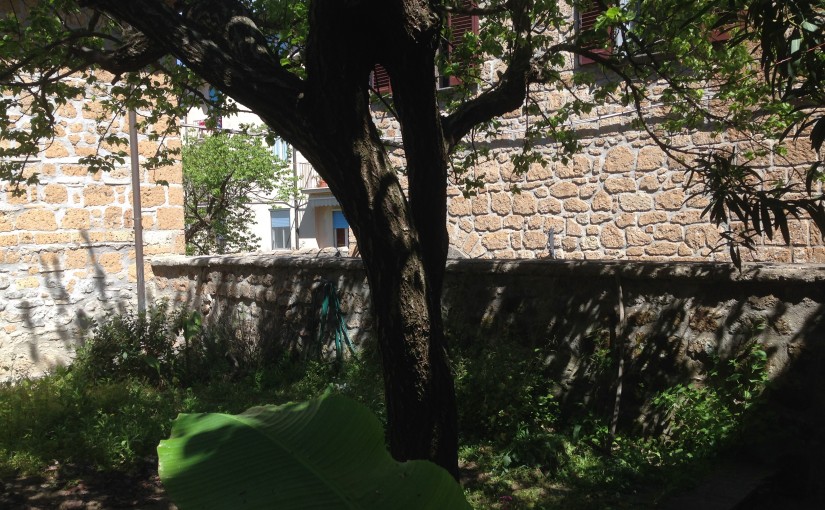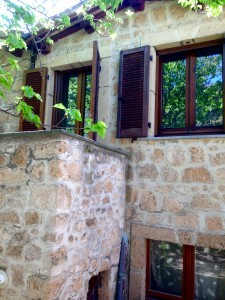It happened suddenly.
I ran into a friend on the street and mentioned I might be looking for a rental in Orvieto. He sent me contact info for a friend of his, a realtor. I wrote, told him what I might be interested in. He showed me a small house, the stone equivalent of a hut in a garden. I had friends look at it, we shared opinions. The next morning I told the realtor I’d take it. All in four days.
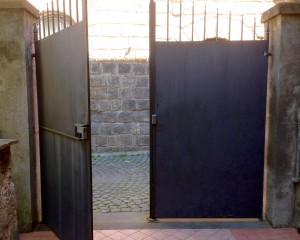 I cannot honestly say that moving in this direction has been without plagues of doubt. My heart says “yes” to this change. My head criticizes me for being too quick, too spur-of-the-moment, too impulsive, for complicating matters for myself and everyone in my life. For not looking at the bigger picture. For trusting what feels right over analyzing what should be best.
I cannot honestly say that moving in this direction has been without plagues of doubt. My heart says “yes” to this change. My head criticizes me for being too quick, too spur-of-the-moment, too impulsive, for complicating matters for myself and everyone in my life. For not looking at the bigger picture. For trusting what feels right over analyzing what should be best.
In the Hindu tradition, the last third of life is ideally spent as a forest dweller. You leave behind the activities of middle age that focused on responsibility, proving yourself worthy, and finding a place within the community. You retreat to live in a hut. You reflect on your deeper nature. You begin to intuit an identity not founded in time and place. You seek to peel away the veneer of personality so as to become acquainted with a consciousness not focused on crafting masks and projecting them outwards.
A decade ago I would listen to descriptions of the forest retreat and scoff; it seemed unlikely and not necessarily all that appealing. Now, I seem to have fallen into the very life I scoffed at and doubted.
Orvieto is not a forest, of course, except perhaps one of stone. I’m not physically 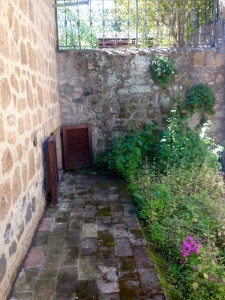 isolated from the world, I’m rocked daily by the tides of community, visitors, and school children in great, noisy throngs. I hear languages around me that sound familiar but are not any that I know. Even English sometimes is mysterious and strange, rising and falling in shattering consonants, punctuated by “yeah” and “sure” and “I know,” but without other words I recognize. Colors and rhythms and movements mix, and a broad spectrum of human characteristics, corporeal and otherwise, crowds this place.
isolated from the world, I’m rocked daily by the tides of community, visitors, and school children in great, noisy throngs. I hear languages around me that sound familiar but are not any that I know. Even English sometimes is mysterious and strange, rising and falling in shattering consonants, punctuated by “yeah” and “sure” and “I know,” but without other words I recognize. Colors and rhythms and movements mix, and a broad spectrum of human characteristics, corporeal and otherwise, crowds this place.
Those other crowds – the other wise – they come from temporal zones far away. They stood on these same bluffs, observed the ancestors of the birds that I observed yesterday, wondered at the shapes of the surrounding hills, the green fields, the gently changing colors of the olive groves. For hundreds of years they traipsed these streets, padded through alleys substantially unchanged in the time-gap that lies between us. Despite the occasional gas meter, traffic sign, and window screen, in essence we enjoy identical views. As with the visitor in space, the visitor in time dresses differently than I do, speaks another language, has other expectations and conceptions of life, aspires to diverse achievements. But we share this city. We share time on a rock.
When I mused to a friend here, almost a year ago, that I might like to spend more time on this rock, he warned that Orvieto can be “very isolated.” That didn’t scare me. That I was supposed to be put off by isolation, did scare me a little. Am I really that weak, I wondered? That a bit of isolation should put me off? Is Orvieto’s short winter between the first week of January and the last week of March really so lonely, so dull, so deprived of stimulation? Should I be threatened by tranquility?
My reaction to lonely, dull, and isolated over the past six months has provided inklings of forest life. Lonely? My choice. Dull? Not with the crowds, large and small, dense and light, all filled with children discovering what magic a wobbling step is, a stone is, a ray of sunlight is. This is isolation? Bring it on. But the language does isolate, as do the webs of relationship that bind this town. A friend born elsewhere, but who has lived here since she was two, is – as another “immigrant” from the South told me – not an Orvietana. Those are genre of isolation that can be quite severe, but is isolation really so bad?
Time spent in the forest is meant to interrupt barriers, upturn assumptions, to calm nervous habits. The isolation required to effect those changes can be brutal, will blossom suddenly sweet, is damned challenging. I watch my mind’s adventures. They’re endless, often fascinating, seldom necessary. I don’t mean to say that thought isn’t useful, but I do mean that random, unfocused, uninvited, and tumultuous thought is exactly as attractive and desirable as it sounds. When I stop – instead of walking and talking to myself, even if silently – and look, listen, feel, and wonder, the Etruscans raise their eyes, birds sing the same songs they sang then, trees vibrate one to the other, and all our roots mingle and remember.
Today a flock of tourists was climbing the hill on Corso as I descended towards my work-in-progress home. They were a cross-section of the world. I took a moment to notice and was stunned by their beauty. A lovely, hefty, rosy black woman caught my eye. We shared a smile of the ages, bumped souls, and moved on.
The dogs across the street, the cats down the block, the baker, the checker, the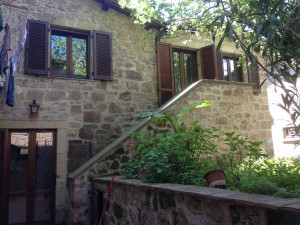 produce lady, and the barista. We’re all connected by mingling roots. If I walk through town distracted, I see nothing but distraction around me. When I’m content to enjoy the beauty of my fellow rock-dwellers, native or transient, their beauty grows unbearably vivid. When we meet eye-to-eye, centuries of fortification crumble at our feet, we dance like the ancients, we augur the moment through the flight of birds, and we watch the miracle of the slowly shifting valley, together, eyes damp with recognition.
produce lady, and the barista. We’re all connected by mingling roots. If I walk through town distracted, I see nothing but distraction around me. When I’m content to enjoy the beauty of my fellow rock-dwellers, native or transient, their beauty grows unbearably vivid. When we meet eye-to-eye, centuries of fortification crumble at our feet, we dance like the ancients, we augur the moment through the flight of birds, and we watch the miracle of the slowly shifting valley, together, eyes damp with recognition.
Then in the middle of a stone piazza, the forest crowds in around us. Protectively. A green embrace.
